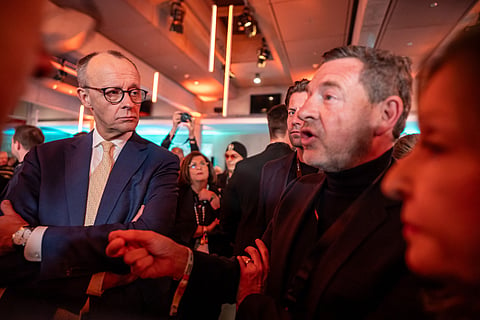
- NEWS
- the EDIT
- COMMENTARY
- BUSINESS
- LIFE
- SHOW
- ACTION
- GLOBAL GOALS
- SNAPS
- DYARYO TIRADA
- MORE

Germany enters the final week of election campaigning Monday, with the debate more heated than ever amid controversy over alleged United States interference in favor of the far right.
After weeks of sparring on migration and a surge of support for the far-right Alternative for Germany (AfD), the race took a new turn last week with comments by US Vice President JD Vance.
Speaking in Munich, Vance called on Germany to drop its decades-long taboo of having the far right in government, insisting there was “no room for firewalls.”
His comments brought tens of thousands of demonstrators to the streets of Berlin on Sunday. The remarks also became one of the main talking points in the latest TV debate between top candidates.
“I will not allow an American vice president to tell me who I can talk to here in Germany,” said Friedrich Merz, whose party is currently leading the polls on around 30 percent.
The conservative CDU candidate told voters he would “not tolerate such interference” in the 23 February polls or coalition negotiations.
Chancellor Olaf Scholz also rejected Vance’s comments as “unacceptable” and asserted there is “no cooperation with the extreme right.”
But the leader of the ascending AfD — which also has the support of top Washington adviser Elon Musk — on Sunday praised Vance for having “spoken out so clearly.”
“We must not build firewalls to exclude millions of voters from the outset — we have to talk to each other. He made that clear,” Alice Weidel told the TV audience.
With more TV showdowns scheduled for the coming days, as well as public rallies, candidates are vying for every vote in the bitter campaign.
Around 30 percent of Germans are still undecided about who they want to vote for in the election, according to the latest surveys.
Viewers of Sunday’s debate put Merz ahead with 32 percent, while Scholz came second with 25 percent saying he was the most convincing candidate, according to a poll by the RTL broadcaster.
Weidel — the first AfD politician to feature in such a debate — found favor with 18 percent of viewers.
She was tied with Robert Habeck of the Greens.
The vote is being held six months earlier than planned after Scholz’s center-left coalition collapsed unable to agree on how to balance the budget.
The campaign since has been dominated by a bitter debate on migration after a series of attacks blamed on asylum seekers.
Most recently, a two-year-old girl and her mother were killed in a car-ramming attack in Munich last week that left 37 others wounded.
